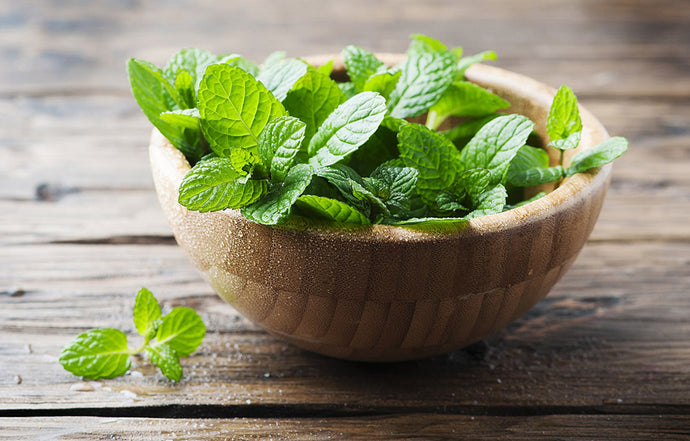
10 Health Benefits of Pudina/Mint Leaves You Must Know
Pudina(mint) is one of the oldest culinary herbs known to humans. Besides its remarkable medicinal properties, Indians have been using it in chutneys, raitas, and sherbets. Pudina is a rich source of polyphenols. Mint has a pungent taste and aromatic odor.
Health Benefits of Pudina/Mint Leaves
Pudina aids indigestion. It has carminative and antispasmodic properties. Chewing pudina helps in getting relief from bloating and gas. The essential oils present in pudina can be beneficial for toothache problems.
Here are the 10 health benefits of pudina that you must know:
1. Helps in Digestion – Pudina is rich in antioxidants, menthol, and phytonutrients that help the enzymes to digest food. The essential oils in pudina possess strong antibacterial and antiseptic effects that calm stomach cramps and help ease acidity and flatulence.
In a study on 90 patients with IBS, peppermint oil has been reported to be helpful in controlling its symptoms of irritable bowel syndrome. It soothes and relaxes the muscles of the digestive tracts to relieve IBS symptoms.
2. Treats Asthma – Regularly taking pudina can ease chest congestion. The methanol in pudina acts as a decongestant, it helps loosen mucus collected in the lung and also shrinks swollen membranes in the nose to allow you to breathe easier. While using pudina, make sure that you don’t overdose it, otherwise, your air passage will become irritated.
3. Cures Headache – Pudina contains menthol that can help relax muscles and ease the pain. Applying pudina juice on your forehead and temples can give you relief from headache. Also, balms of pudina base or mint oil are effective in curing headaches.
4. Eases Stress and Depression – One of the main advantages of mint is that it is the most widely used herb in aromatherapy. Pudina or mint has a strong, refreshing smell that can ease stress and refresh the body and mind. The apoptogenic activity of mint helps regulate the cortisol levels in the blood that triggers the body’s natural response to ease the stress. Inhaling pudina essential oil can instantly release serotonin in the blood which is a neurotransmitter that is well known for easing symptoms of stress and depression.
5. Makes Your Skin Healthy – Pudina has anti-inflammatory and anti-bacterial properties that help treat acne and pimple on the skin. Pudina leaves contain a high amount of salicylic acid which acts as anti-acne. It also acts as an effective skin cleanser.
Pudina has antioxidant properties that help you get clean and youthful skin by removing free-radicals from the body. Other ways pudina makes your skin healthy is that it retains the moisture in the skin, clear off dead skin cells, and dirt from the skin pores, and makes the skin look radiant and toned.
6. Oral Care – Chewing pudina leaves is a great way to improve oral hygiene and dental health. The essential oils in pudina can help you get fresh breath. Also, using the mouthwash containing peppermint oil can help you kill bacteria in the mouth and provide you with healthy gums and teeth.
7. Improves Memory – According to research, pudina can improve memory and retrieve the cognitive function of the brain. Consuming pudina regularly can increase brain power by improving alertness, and memory retention, and other cognitive functions.
8. Promotes Weight Loss – The aromatic herb pudina could help you in weight loss. The essential oils of pudina stimulate digestive enzymes to increase the bile flow and promote digestion. It also helps in improved nutrient absorption from the food. When the body is able to assimilate and absorb nutrients properly, your metabolism increases. The increase in metabolism promotes weight loss.
9. Treats Common Cold – If you are struggling with cold and finding it difficult to breathe, pudina is the best remedy for it. Most of the vapor rubs and inhalers contain mint. Mint naturally clears nose throat, bronchi, and lung congestion. Apart from respiratory channels, mint also eases irritation caused by chronic coughing.
10. Eases Symptoms of Nausea – Pudina is an effective treatment for nausea that often occurs in morning sickness. Eating a few pudina leaves or smelling it every morning can help pregnant women prevent the nauseous feeling or cope with it better.
Mint Nutritional Benefits
Pudina leaves or mint leaves are low on calories and contain very low amounts of proteins and fats. It has an enormous amount of Vitamin A, C, and B-complex that enhance skin and boost immunity. Another nutritional benefit of pudina is that it is rich in iron, potassium, and manganese that increase hemoglobin, and improve brain function.
Here is a nutritional profile of pudina leaves or mint leaves of 2 tablespoons serving size.
Calories – 2.24
Protein – 0.12 g
Carbohydrates – 0.48 g
Fat – 0.03 g
Fiber – 0.26 g
In addition to this, pudina leaves contain minimal amounts of phosphorus and essential oils that neutralize free-radicals from the body and support overall health.
How to Use Pudina
Pudina is generally used to add flavor to mocktails, chutneys, and juices. Here are some interesting ways to use pudina in your daily diet and enjoy its benefits.
Pudina Tea – To prepare the pudina tea, boil some water and add a few pudina leaves to it. Give some time to allow the water to soak up all the aroma and flavor of pudina. Lastly, strain the tea and add a few drops of lemon juice or honey for taste. Enjoy it early in the morning or evening with your family.
Pudina or Mint Salad – Salad is a super-healthy food. Adding a few pudina leaves to cucumber and pomegranate salad or other fruits salad will enhance its flavor and taste.
Pudina Chutney – In India, chutney makes the best combination with dal-chawal (pulse and rice). Also, you can add fresh mint chutney to have sandwiches and snacks. It can be prepared with pudina leaves, coriander leaves, ginger, garlic, and chilies.
Pudina or Mint Lassi – Lassi is a tangy and refreshing drink that will make your mood in summer. Making pudina lassi is easy, you simply need to blend the curd with fresh mint leaves, black salt, sugar, and cumin seeds.
Besides the culinary use of pudina, you can also consume a variety of pudina products for medicinal purposes. Here are some of the medicinal use of pudina or mint products.
Pudina Capsules – Take 1-2 pudina capsules, swallow it with water one or two times a day for treating gas, bloating, or nausea. There are multiple health benefits of pudina and your Ayurvedic doctor may prescribe it to treat various health conditions.
Pudina Drops – Take 15-20 pudina drops of pudina and add it to a glass of water. Take preferably after meals to improve digestion. You can also add 2-5 drops of pudina oil to the coconut oil. Mix them and apply the mixture to the affected area for quicker recovery and healing of wounds.
Pudina Powder – Take ½ to 1 teaspoon of pudina powder and add rose water to it. Apply it to the affected area to get rid of black spots and scars on the skin.
Precautions When Using Pudina
Pregnant women should consult their Ayurvedic doctor before taking pudina products. Patients with liver or kidney disease should also avoid pudina. Some of the known side effects of pudina are heartburn, nausea, and dry mouth. Patients with gastroesophageal reflux disease (GERD) should also avid pudina as it may worsen the symptoms of this disease.
Pudina can be easily added to your diet, though research shows several health benefits of consuming pudina as a capsule. Our Pudina instant capsules are packed with the benefits of high-quality pudina’s essential oils and extracts. This is the best pudina formulation to help you get all the health benefits of mint.

